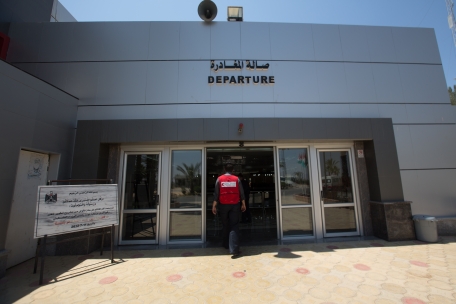She wanted to stay a little longer with her father and got stranded in Gaza.

She couldn’t have guessed Rafah Crossing would close almost completely.
Photo: Emman Mohammed
May 28, 2014. When Sara (not her real name) decided to spend some more time with her father in Gaza, she didn’t know about the changes that would take place in Egypt or that that Rafah Crossing would be almost completely closed. Her mother, brother and sisters had already left Gaza for the United States, where they have permanent residency, and 15-year-old Sara thought she could easily join them later. However, following the change of regime in Egypt, Rafah Crossing was closed and Sara found herself stuck in Gaza.
Sara’s father, Dr. Said (not his real name) needs to be away from the house for hours at a time in order to attend meetings and conferences, leaving Sara at home alone. Although the military routinely gives him permits to enter Israel in order to travel abroad, Sara’s own request to leave Gaza via Erez Crossing was rejected. When the time came for her father to travel abroad, he had no choice but to leave his daughter at his parents’ home in Gaza.
Israel’s policy on entry to Israel from Gaza for the purpose of travel abroad is extremely restrictive and is generally limited to students with scholarships (who are traveling to study in a third country), and to those with foreign residency status. In addition to these preliminary requirements, the army insists that the relevant foreign consulate submit a request on behalf of the individual seeking to travel. However, for Sara, the demand created an impassable procedural barrier: when Gisha contacted the American Consulate, we were told that the consulate does not assist American permanent residents, only citizens, and only in emergencies.
Gish sent a letter to the military, explaining Sara’s unique humanitarian circumstances and that, in some cases, the military must make exceptions, using discretion and flexibility. The letter resulted in the military approving Sara’s exit from the Strip just a few days after Dr. Said went abroad. Sara crossed via Erez Crossing and then Allenby Bridge into Jordan from where she flew back to her family in Utah.



